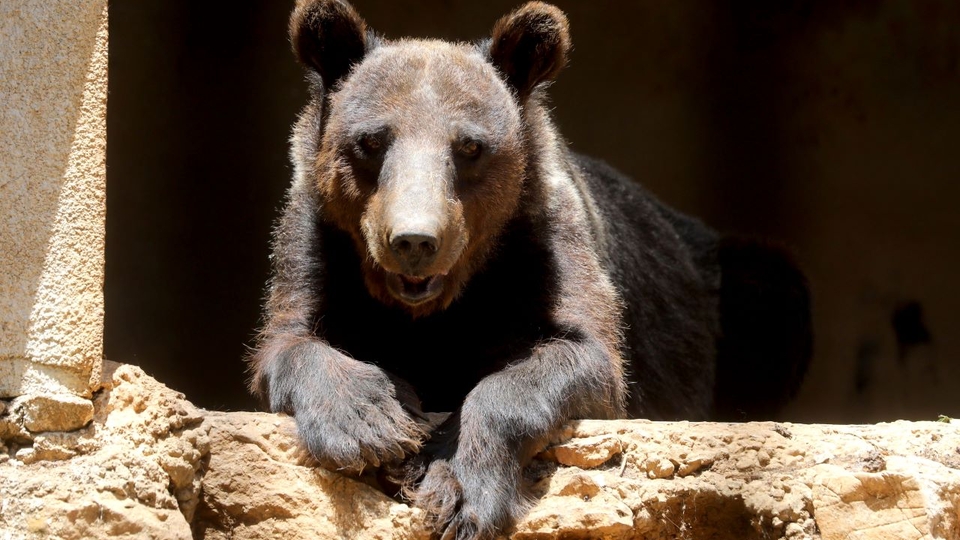Wild Encounters: Meet the Eco-Warriors and the Endangered Animals They Defend
Ali Jawhar carried out his first wild animal rescue two years ago. He was sitting at home in Saida, where he works as a freelance graphic designer, when he got the call. Someone found a jackal and brought it to the veterinary clinic in the nearby town of Ghaziyeh. He was asked if he could help take care of it.
In the car, on the way to the clinic, Jawhar nervously imagined the legendary animal he was about to meet. Would it be large and menacing? How would he care for it?
Inside the two-story clinic, he saw a small cage, dwarfed by the two men looming over it. He thought it was a kitten; the jackal must be somewhere else.
Approaching cautiously, he saw a small canine crouched inside the cage, paralyzed with fear and unable to move. “I was not expecting such a small creature, honestly,” he laughed. “It was such a weird and pleasant surprise.”
The jackal ended up at the clinic thanks to Hussein Hamze, a local animal rights activist. He had found the animal near the dog shelter he runs in the town of Zefta. Not sure what to do, Hamze contacted The Green Southerners, an environmental non-profit in the region.
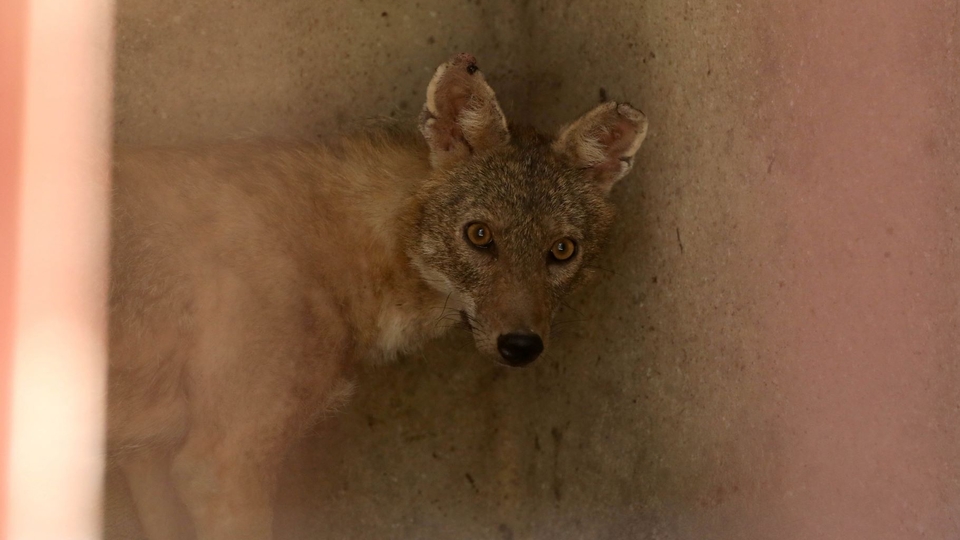
A jackal retreats, avoiding human contact as strangers approach it at the “Animal Encounter” shelter. Aley, Lebanon. July 28, 2023. (Marwan Tahtah/The Public Source)
The Green Southerners are part of a burgeoning movement of organizations across Lebanon dedicated to safeguarding the country’s wildlife, restoring its natural habitats, and combating stereotypes that deem certain animals as dangerous and undeserving of life.
These eco-guardians are building local aid, shelter, and emergency networks to protect Lebanon's wildlife — and even running political pressure campaigns to preserve wild habitats. And when they hear about an animal in distress, they come to the rescue.
The movement achieved a major milestone in 2017, when former President Michel Aoun signed the country’s first ever animal welfare law. The law outlawed animal abuse and outlined regulations for zoos, pet shops, and stray animal populations. After the law was passed, organizations like Animals Lebanon worked with the Agriculture Ministry to develop guidelines and decrees to implement some of its articles. But the state’s near-collapse over the past five years meant that those decrees were not issued. Today, the law remains largely symbolic.
Enter the Green Southerners and other similar groups. In recent years, these eco-guardians have tried to fill the void left by the government. They are building local aid, shelter, and emergency networks to protect Lebanon's wildlife — and even running political pressure campaigns to preserve wild habitats. And when they hear about an animal in distress, they come to the rescue.
“Working with animals not only brings peace of mind, but also reinforces the fact that there’s a delicate natural cycle that must remain intact.” —Ali Jawhar, Green Southerners volunteer
When The Green Southerners heard about the jackal, they reached out to Jawhar, who lived near the clinic, and was part of the organization’s network of people willing to care for animals in need. After the vet confirmed that the jackal was free of injuries, he recommended that it stay in Hamze’s shelter with the other canines. Jawhar would follow up periodically to ensure that the tiny jackal (it turned out to be male) was receiving proper care.
“Working with animals not only brings peace of mind, but also reinforces the fact that there’s a delicate natural cycle that must remain intact,” said Jawhar. “Otherwise, we will face the consequences.”
The Southern Protectors
Dr. Hisham Younes launched The Green Southerners 10 years ago, with the goal of safeguarding the natural and cultural heritage of southern Lebanon. From its base in Sour, the group conducts rewilding initiatives, as well as campaigns to protect public spaces and communal property. Over the years, the group has garnered supporters across the country, particularly among young people appalled by the abuse of the natural world.
Among them is Jawhar, the graphic designer-turned animal protector, who has harbored a deep love for animals from a young age. When not at school or helping his parents, he spent his time playing with kittens and birds he found around his home. He loved birds, and would spend hours reading about wildlife from encyclopedias his parents brought home. As he got older, his affection for wildlife only grew. In 2019, he joined The Green Southerners, where he learned about bird care from veterinarian Dr. Sorraya Sabbagh, who is also a member of the group.
“You grow up hearing all these terrible stories about wild animals that make them seem fearsome. But when I saw them up close, they were like tiny, harmless puppies.” —Ali Jawhar, Green Southerners volunteer
Raising awareness is another central part of the Green Southerners’ work, according to Rim Ghrayeb, a core member of the group. “We try to maintain a strong presence on social media platforms, particularly on our official page where people report most of the violations and cases of injured animals,” she told The Public Source.
In addition to social media, the group visits local schools to help dispel common myths and raise awareness of the importance of respecting wildlife. “You grow up hearing all these terrible stories about wild animals that make them seem scary,” said Jawhar, recalling the myths he had learned about jackals and hyenas. “But when I saw them up close, they were like tiny, harmless puppies.”
Jackals, he explained, have a reputation for being ferocious animals that assault humans without reason. The reality is different. “Jackals might defend themselves if provoked,” he said. “But it's humans who have invaded their habitats and killed them out of ignorance."
The Green Southerners operates an observatory that verifies allegations of harm to wildlife and biodiversity, and coordinates with law enforcement agencies to address the issue. In cases of large-scale threats, such as new developments that threaten to destroy habitats, the association raises public awareness and occasionally pursues legal action.
“Jackals might defend themselves if provoked. But it's humans who have invaded their habitats and killed them out of ignorance." —Ali Jawhar, Green Southerners volunteer
In 2023, The Green Southerners and the advocacy research group NAHNOO raised concerns about a new housing project in the town of Naqoura that threatened wildlife on Lebanon’s southern coastline. At first, the Ministry of Public Works ignored their request to revoke the construction permits, so the organizations filed a complaint against the environment and public works ministries and launched an online campaign that gained the support of members of parliament. Subsequently, Lebanon’s caretaker Environment Minister Nasser Yassin requested that caretaker Public Works Minister Ali Hamieh stop the construction work.
Ghrayeb described the outcome as proof of the Green Southerners’ growing influence. Over the past decade, the group “has been successful in spreading new environmental ideas to the public,” she said. “Our members connected the local community to an environmental base, turning them into partners in the environmental struggle.”
Preserving Lebanon’s Birds
White storks typically grace the skies of Lebanon in the spring, their signature long legs, white breasts, and black wings casting a graceful silhouette as they soar overhead in intricate and synchronized V-shaped formations. In the spring of 2021, poachers shot thousands of white storks out of the sky during their annual migration through Lebanon. In one video of the incident posted on YouTube that year, a group of men emerged from a vehicle and hastily aimed their rifles at a flock. Shots rang out — one, two, three — followed by a barrage of gunfire.
“Make sure to film this!” one of the poachers shouted at the cameraman as he ran to claim his prey.
While the killing drew widespread criticism in the animal welfare community, it was hardly the first event of its kind.
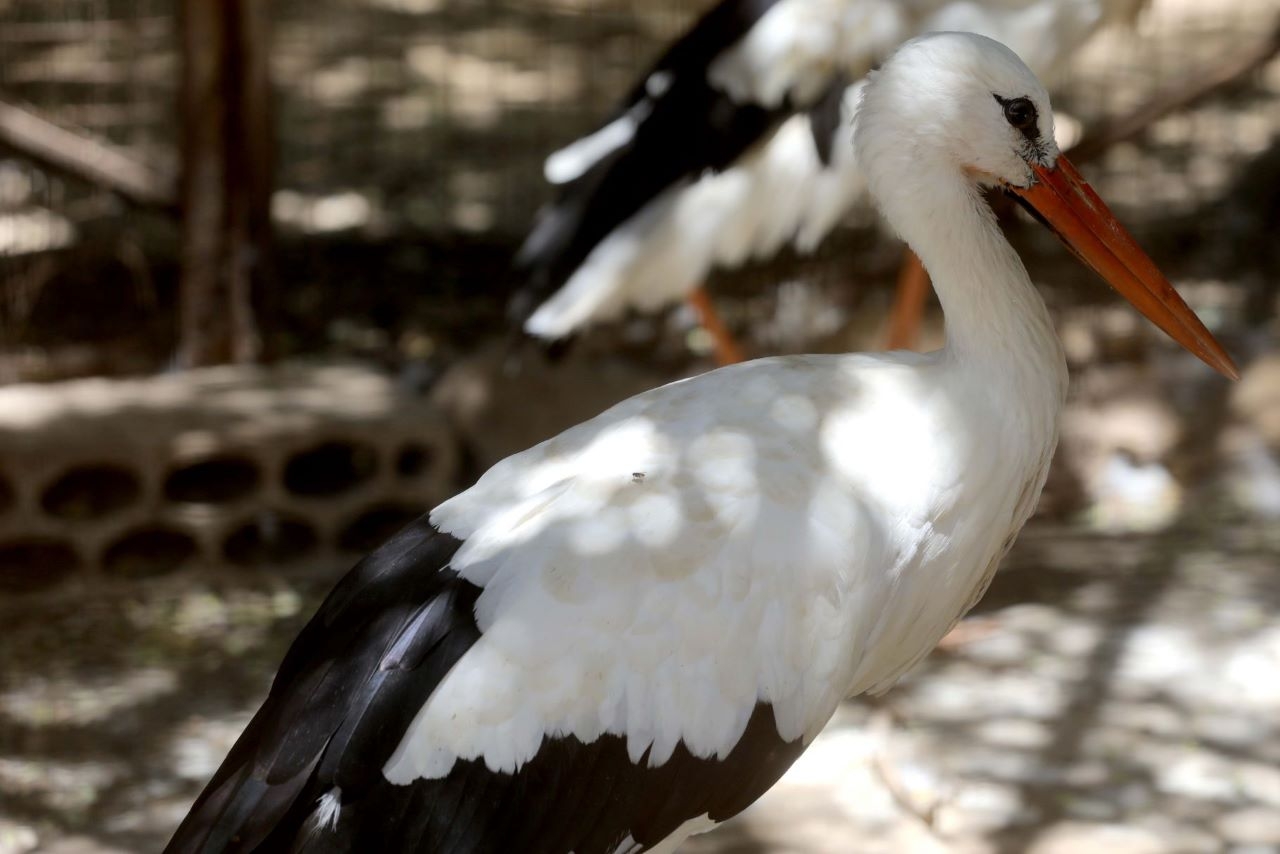
Image of a stork inside its cage at the “Animal Encounter” shelter. Aley, Lebanon. July 28, 2023. (Marwan Tahtah/The Public Source)
Approximately 37 species of migratory birds seek sanctuary in Lebanon during their annual migration from Europe to Africa. In addition to the other threats they face along this journey — pollution, electrocution, deforestation — the birds must often confront the salvos of hunters’ rifles as their migration route narrows over Lebanon’s mountain ranges. Some 2.6 million birds fall victim to unlawful poaching every year in Lebanon, according to BirdLife International, a consortium of bird conservation NGOs. Although hunting migratory birds is strictly forbidden under the wildlife hunting law, illegal practices persist.
Among the groups caring for birds as they pass through Lebanon is the Association for Bird Conservation in Lebanon (ABCL). The organization’s conservation work includes education and outreach initiatives such as bird-watching workshops and awareness campaigns.
“It’s heartbreaking to witness this senseless killing, and what’s even worse is that the poachers know they [the storks] are inedible. They do it merely to show off on social media.” —Fouad Itani, Director of the Association for Bird Conservation in Lebanon
Director Fouad Itani said he’s noticed that white storks are reluctant to stay more than a few days in Lebanon. “Birds are intelligent creatures, and they know they are not in a safe area, so they choose to leave instead of staying,” Itani told The Public Source. “It's a shame because we are the ones losing here.”
In the past, Itani said, storks helped farmers decrease their reliance on pesticides by following tractors and feeding on insects and rodents in the fields. But deforestation has limited the number of places that storks can perch to stay safe from predators. Poachers have exploited this vulnerability, hunting the diurnal birds at night with military-grade weapons, leaving them no chance of escape.
Itani says his organization makes an effort to report these incidents to the security forces when they occur. But officials often arrive late, and poachers are lightly punished, if they face any consequences at all. Without a robust enforcement infrastructure, he worries that the slaughter will likely continue.
Fouad Itani noticed that white storks are reluctant to stay more than a few days in Lebanon. “Birds are intelligent creatures, and they know they are not in a safe area, so they choose to leave instead of staying.”
“It’s heartbreaking to witness this senseless killing, and what’s even worse is that the poachers know the storks are inedible,” Itani said. “They do it merely to show off on social media.”
Swimming With Sharks
On a scorching day last June, Samir Hammoud headed to Qlaileh Beach in southern Lebanon with a friend to go skin diving. The sky that day was clear and the water sparkled from the intense summer sun. He had just swum out 50 meters from shore and began to dive when he noticed a large figure beneath them. It was a shark, about a meter and a half long, partly obscured by the murky water. Another even larger shark followed closely behind.
As the two creatures approached, Hammoud instinctively froze. He signaled to his friend to make him aware of their situation.
“At that moment, I felt a wave of fear wash over me,” Hammoud told The Public Source. “I knew I had to think fast and remain calm.”

Screenshot of sharks swimming in the sea from the short documentary “Beneath The Waves” dedicated to Lebanon”s renowned conservation activist and diver Ziad Samaha.
Hammoud's options for self-defense were limited. He carried a knife tied around his body and a speargun, in case of emergencies, such as getting caught in a fishing net. But these tools, he realized, would be of little use against such a large creature. With the sharks only a few meters away, the two divers decided to follow some advice Hammoud had once read online: continue to swim slowly and avoid splashing. After a few minutes of this, the sharks completed their circle and swam away.
“Honestly, I felt like I could have had that encounter with stray dogs,” Hammoud said. “There’s a chance that a stray can attack you, but all you have to do is keep calm and mind your business.”
Sharks, the apex predators of the oceans, have long been an object of fear and loathing. In reality, the species plays a crucial role in maintaining healthy marine ecosystems by consuming smaller types of aquatic life like fish, crustaceans, and mollusks.
“We see sharks as monsters when they are only fish with characteristics to respect.” —Samir Hammoud, rescue diver from Saida
In his 20 years of diving, Hammoud had never worried about sharks, believing that they did not frequent Lebanon's sea. Over the past century and a half, there have been just three recorded incidents of shark attacks in Lebanon. It wasn’t until a few years ago that fishermen started to inform him that they were spotting sharks off the coast.
As with the killing of storks, some of these fishermen were killing these sharks just to brag about their hunt. “We see sharks as monsters when they are only fish with characteristics to respect,” he said.
Sharks are not new to the Mediterranean and do not pose a serious danger to humans unless they feel threatened, according to the National Council for Scientific Research-Lebanon. Researchers at the National Center for Marine Sciences in Beirut found that sharks hunt at depths between 10 and 600 meters, which is significantly deeper than where most swimmers typically find themselves.
Close Encounters of the Animal Kind
Nestled in the lush city of Aley, the small shelter known as “Animal Encounter” blends into its surroundings, shielded by trees and the attentive care of Dr. Mounir Abi Said, an ecologist, mammalogist, and professor at the Lebanese University in Beirut.
Inside, a jackal is startled from its nap by the sound of footsteps and begins pacing about nervously. Dr. Abi Said begins to feed meat to the wild dog in an effort to calm it down.
“The jackals have become used to living alongside human beings,” Dr. Abi Said told The Public Source. “However, it should never be treated like a pet, especially due to the risk of rabies, which can endanger people.”
Abi Said's shelter is home to many wild creatures. He and his wife Diana established the refuge in 1993 with the hopes of challenging negative perceptions of animals and reviving local species through captive breeding. The center found itself looking after a variety of creatures that were either injured or endangered and in need of care before being released back into their natural habitat.
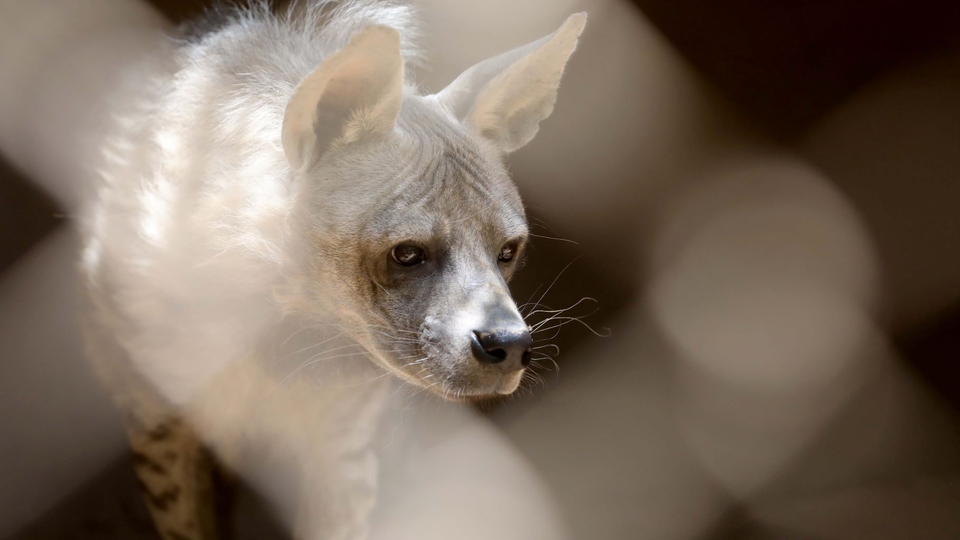
Image of “Lucky,” a rescued hyena at the “Animal Encounter” shelter. Aley, Lebanon. July 28, 2023. (Marwan Tahtah/The Public Source)
Upon entering the shelter, visitors encounter a small group of storks, followed by boars, foxes, wolves, and a jackal. Cages housing vultures and eagles — birds rarely seen by most Lebanese — are spread throughout the space.
Continuing up the stairs, visitors reach a large enclosure containing two striped hyenas, Lebanon's national animal. Known for its laugh, which can sound like a deranged human cackle, these animals are cloaked in myth. One persistent fiction depicts them urinating on their tails and throwing the urine into people’s eyes to temporarily mesmerize them before dragging them to their caves and killing them. Another depicts them as grave robbers, and yet another warns against looking into their eyes for fear of being hypnotized and attacked.
The hyena at Abi Said's shelter, affectionately named “Lucky,” arrived in 2019 as a cub. A poacher had killed the animal’s mother in Akkar. Concerned strangers brought Lucky and his three siblings to Abi Said's sanctuary. Lucky was the only one to survive the journey.
The striped Lebanese hyena is smaller than its spotted sub-Saharan counterpart, and plays a vital role in maintaining ecological balance in its habitat. It has a powerful immune system, which allows it to consume carcasses, limiting the spread of disease.
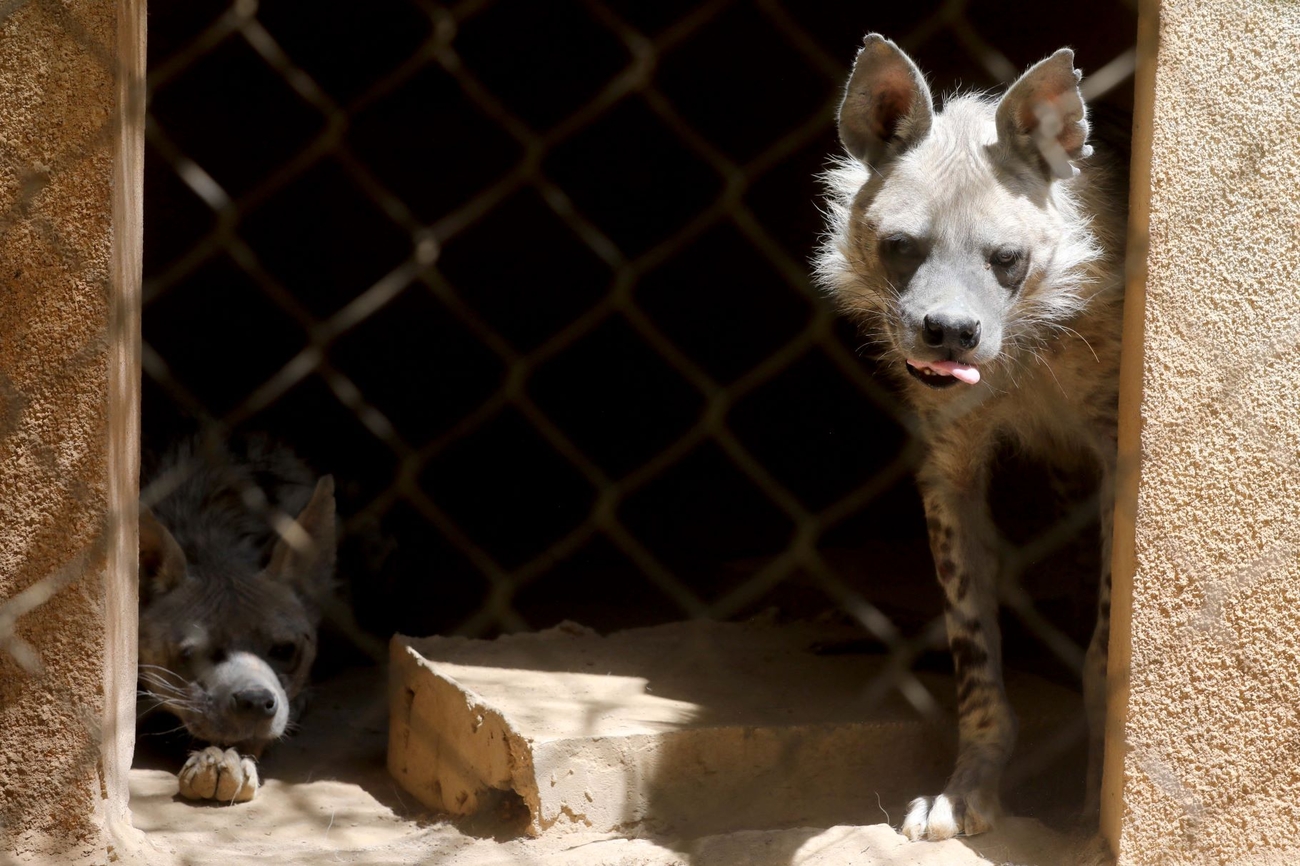
“Lucky” and his female companion resting in their built-in house at the “Animal Encounter” shelter. Aley, Lebanon. July 28, 2023. (Marwan Tahtah/The Public Source)
Despite the many myths depicting them as vicious, hyenas are silent travelers that tend to avoid trouble, said Abi Said. Indeed, at the first sign of people, Lucky’s black and white fur stood upright, signaling his nervousness, and he retreated into the cage he shared with his female companion. The Green Southerners had brought the second hyena in 2019, hoping that the two would mate.
While Abi Said typically releases wild animals once they are treated and healed, he said that Lucky has become too accustomed to human interaction and is now "spoiled and cuddly.” He can touch, play with, and feed Lucky. But he emphasized that wild animals should never be considered pets. Upon encountering a hyena in the wild, Abi Said said, one should remain calm and wait for it to leave. Given the species’ shy and nocturnal nature, he added, such an encounter is unlikely.
The striped Lebanese hyena plays a vital role in maintaining ecological balance in its habitat and despite the many myths depicting them as vicious, hyenas are silent travelers that tend to avoid trouble.
“People most likely did not understand the behavior of hyenas back in the day,” he said, “and just thought it would be better to shoot them out of fear.” The killing of hyenas may seem more common today, he said, due to social media, but it has actually decreased.
Despite the persistence of myths and fear, animal welfare groups have given us a fresh understanding of how to interact and coexist with the natural world. “I can assure you that we’ve seen a lot of changes in society,” said Abi Said, “especially with the younger generations, due to awareness and access to information.”
Editor’s Note: In remembrance of Ziad Samaha (1982-2023), the late marine conservationist known among his friends and colleagues as a fierce defender of sharks and affectionately nicknamed “sharky,” we invite you to unlearn common shark myths and support his legacy.
